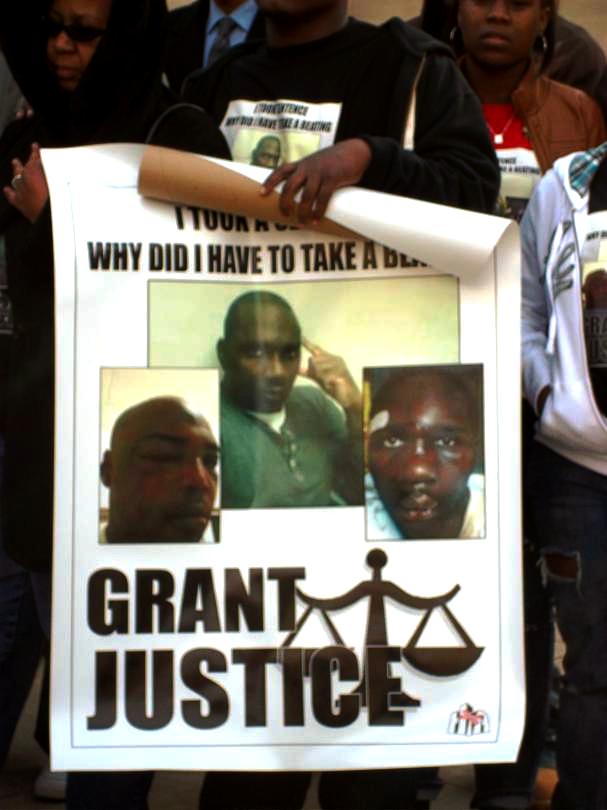
GA prisoner advocates with poster showing beaten prisoners at press conference Jan. 6/Photo Kristi E. Swartz AJC.com
Link to video of press conference at
http://www.youtube.com/watch?v=quKL-n4C0OU&feature=youtube_gdata_player
Locked down, exploited and mistreated
By Charlene Muhammad and Starla Muhammad -Staff Writers-
Updated Jan 4, 2011 – 12:31:55 PM
Concern rises about inmates allegedly beaten by guards in Georgia strike and mistreatment of prisoners detained in institutions across the country
(FinalCall.com) – Like thousands of inmates scattered in prisons across the state of Georgia, Terrance Bryant Dean participated in an eight-day peaceful protest to highlight inhumane conditions in the prisons.
Days later he was brutally beaten by guards at Macon State Prison, his family and a coalition of supporters charge.
When his mother Willie Maude Dean and members of the Concerned Coalition to Respect Prisoners’ Rights attempted to visit him at the Atlanta Medical Center on Dec. 31, the hospital claimed her son was no longer there and the corrections department claimed he was moved to Jackson State Prison the night before, according to an alert The Final Call received from Coalition co-chair Elaine Brown.
Ms. Brown said the Coalition found out about the beating during its second fact-finding visit to Smith State Prison on Dec. 30. Its first prison visit was to Macon on Dec. 20.The Coalition asserts the beating was in retaliation for the protest, which began in early December.
In addition, Ms. Dean said the Georgia Department of Corrections has given no information about her son’s condition or his whereabouts.
The mother told Coalition leaders after their latest visit that Macon State Warden Gregory McLaughlin told her that Terrance was in an isolation cell, but the mother believes he was already in the hospital.
The family of a second inmate, Miguel Jackson alleges he was severely beaten by upwards of 20 guards Dec. 31 during what is called a “shakedown” at Smith State Prison near Glennville, Ga. in which corrections officers search prisoners’ cells. Upon finding nothing, said Mrs. Delma Jackson, Miguel’s wife, the officers accused Mr. Jackson of having “something.” Mr. Jackson was pepper sprayed, handcuffed and beaten repeatedly with hammers resulting in a fractured nose and 50 stitches to his face, said Mrs. Jackson. Guards also attempted to throw him over the railing from the second floor, she said.
And because the family has not been allowed to see him, his wife said they worry whether or not he may have a concussion or internal injuries. Upon seeing pictures of her husband, Mrs. Jackson said she and other family members drove New Year’s Day, three and a half hours from Atlanta, to check on his status. Their visit was denied by corrections personnel, she said. This was after the family waited 90 minutes to be given a sheet to fill out, requesting a visit. “We didn’t even want to sit there and visit, we just wanted to see that he was okay and they denied us that right,” Mrs. Jackson told The Final Call.
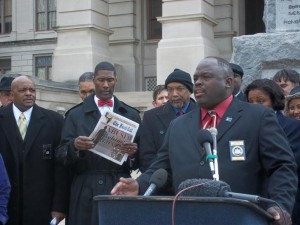
GA NAACP Pres. Edward DuBose and Concerned Coalition to Respect Prisoners' Right hold press conference in Atlanta Jan. 6 demanding better conditions for prisoners and end to beatings/Photo Kristi E. Swartz AJC.com
was awaiting a reply to its voice message request for an interview with the Department of Corrections’ Public Affairs Office. The latest update on its web page is dated Dec. 15 and indicates that four facilities had returned to normal operations.The Final Call. She was upset that the prison still had not contacted her or the family about whether Mr. Jackson was in the infirmary with injuries. “That is our loved one, he’s a human being and their treating him like an animal,” she said. At press time, Mrs. Jackson said her husband’s fractured nose as of Jan. 3 still had not been reset and she worried the violent encounter will affect him psychologicallyWhen she asked prison officials why visitation was denied, all officials said was that there was an “incident” and the only one authorized to approve a visit would be the warden, who was not there, Mrs. Jackson continued.
The prisoners’ strike included Hays, Smith, Telfair, Macon State Prisons, and other facilities. Inside the institutions, inmates refused to come out of their cells to petition officials to be paid for work given that they must pay for medical services, better medical care and better quality food, more self-improvement and educational programs, consistent disciplinary policies and a clear parole policy.
Coalition spokespersons said that beating occurred around the same time it was negotiating access to certain prisons to investigate conditions, and even as the delegation visited Macon State, the corrections department was apparently covering up the inmate’s reported retaliatory beating by several CERT (Correctional Emergency Response Team) members.
Witnesses reported to the Coalition that CERT officers restrained Terrance Dean after an alleged dispute with a guard, dragged him from his cell in handcuffs and leg irons, removed him to the prison gym and beat him unconscious.
The beating remained unreported by corrections officials even though the Coalition specifically raised questions about reports of retaliatory beatings, said the group. Questions were also asked about the status and whereabouts of 37—or more—men the corrections department identified as strike “conspirators,” the Coalition said.
The Coalition formed to help support the prisoners’ calls for reform and includes the NAACP, the Nation of Islam, the ACLU of Georgia, the U.S. Human Rights Network, All of Us or None, and The Ordinary People Society. Among other concerns is the potential cover up of an attempted murder.
“This agenda just got jumped up 10,000 times, not by us, but by them, these men who are suffering inside these walls.They’re the spark that lit the prairie fire and hopefully we who are on the outside that have united around their particular interests in Georgia can keep this going.The coalition has attracted a lot of people but the interesting thing is where in the hell is John Lewis? The coalition is growing but absent in any kind of way is the Congressional Black Caucus,” Ms. Brown said, referring to Congressman John Lewis (D-Ga.) and other federal lawmakers.
She told The Final Call that few political officials from Georgia have addressed the issue. But State lawmaker Roberta Abdul Salaam has been very supportive, said Coalition leaders. The Coalition has reached out to CBC Chair Rep. Barbara Lee (D-Calif.) and Rep. Lewis but have not received a response, said Ms. Brown.
“Everybody else in the world has come in without us sending a message to them, but not them. Where is the CBC? These men are their constituents, especially John Lewis, Tyrone Brooks (a state representative), and other Black leaders in Georgia?” asked Ms. Brown.
“We need them to do something; bring the federal government in on behalf of these men … . This is a disgrace that these people came into office on the blood of our people like Fannie Lou Hamer who gave up her eye and her life … The duty of Black elected officials here is clear and they have failed to do their duty to these men and address this question. And I’m saying they should come on back home before we have to start talking about what we’re doing about their failure,” Ms. Brown said. Ed DuBose, head of the Georgia state NAACP, is co-chair of the Coalition.
Coalition: Inmates complained of retaliation after peaceful strike
“They (inmates) got shipped out of their home institutions and were dispersed across the state.We think that they were primarily dispersed into two facilities but we have not had access to them yet,” said Ajamu Baraka, director of the U.S. Human Rights Network, and a member of the delegation that visited Smith State Prison.
He said, “among information received was that prisons only fed the inmates bologna sandwiches for six days—all to break the back of the strike. And then they released everybody and announced to the world that everything was fine. But the information we got was that the inmates understand that they struck a blow for their rights (and) that they may have to strike again to make sure that people understand how serious this situation really is,” Mr. Baraka told The Final Call.
After the visit, he said, the Coalition’s concerns over conditions grew, particularly since Macon was supposed to be a model facility. For example, he said, “the hole” or isolation units, consist of 7 x 12 size cells and inmates are double bunked in them 24 hours a day, seven days a week. Although inmates are supposed to get an hour out for recreation, the delegation learned that they hardly ever do for months at a time, Mr. Baraka added.
Mr. Baraka said he feels one reason prison authorities moved to shut down the strike quickly was because it could serve as a possible model for prisoners across the country.
But the outcome of the action in Georgia will determine whether there will be more and similar uprisings across the U.S., he predicted.

Former Pres. Bill Clinton responsible for Prison Litigation Reform Act, which took away prisoners' rights to sue for mistreatment
“The conditions in these prisons across the country are such that it’s amazing that we haven’t had more explosive situations or strikes because you have overcrowding, brutality, neglect, and the inability of prisoners to address these issues because of the Prison Reform Litigation Act passed by the Clinton administration, which has made it difficult for you to go to court to try to get the judiciary to intervene to deal with these inhumane conditions,” Mr. Baraka continued.
According to legal analysts, former President Bill Clinton passed the Prison Reform Litigation Act in 1996 to combat frivolous lawsuits brought by prisoners, in an effort to unclog an already back-logged U.S. judicial system.
But Human Rights Watch said the federal law should be amended because it denies prisoners equal access to justice by singling out their lawsuits for burdens and restrictions that apply to no one else.
Racially biased policies and the prison economy
All of these issues are part of the larger problem with having a prison economy, said Attorney Michelle Alexander, a civil rights advocate and author of “The New Jim Crow: Mass Incarceration in the Age of Colorblindness.”
She told The Final Call she doesn’t believe profit was the primary motive for the drug war and mass incarceration at the outset.
Nonetheless, the numbers are daunting.In 2007, nearly 2.3 million people were locked up in U.S. prisons, the highest incarceration rate in the world. Nearly one million Black men and women are incarcerated, 41 percent of total inmates.
According to criminal justice statistics by the NAACP, Blacks are incarcerated at nearly six times the rate of Whites; one in six Black men had been incarcerated as of 2001; and one in 100 Black women are currently in prison. The U.S. is five percent of the world population yet has 25 percent of the world’s prisoners, according to an NAACP fact sheet.
This mass incarceration comes out of racial politics stirred up by the Republican Party, Atty. Alexander argued. Essentially, she said, the GOP exploited the fears and anxieties of poor, working class Whites by launching a movement, promising to “get tough” on “those people” and built a campaign around crime and welfare to mobilize poor and working classWhite voters to defect from the Democratic Party and join the Republican Party in droves.
“But now that the war on drugs and mass incarceration has gained such steam, there’s a whole range of interests that has found that they can profit from caging human beings and it’s not just the private prison companies listed on the New York Stock Exchange but it’s a whole range of corporate interests,” she said.
“You know, taser gun manufacturers, phone companies that gouge prisoners and their families, the private health care providers that provide typically abysmal health care to prisoners, and prison guard unions,” all of whom now lobby for harsh criminal justice policies to try to ensure their profits and jobs will continue for a foreseeable future, Atty. Alexander said.
Back in the day, prisons used to have their stock prices posted in the front of the facilities, because guards had employee stock options, according to Alex Friedmann, associate editor of Prison Legal News and president of the Private Corrections Institute, a non-profit advocacy group that opposes the privatization of prisons.He spoke of his past experience of 10 years of incarceration.
“When the guards came into work, they could see how well the company was doing … so they had a vested interest to make sure that the company did well, so that meant cutting back on costs, so if you had to screw prisoners out of something or remove something from them to save money and increase your bottom line, that’s what you would do. … It went along the lines of a for-profit industry, you know, ‘These are little money signs, just $45 a day per diem that we make for keeping them in prison, so it’s not really a person, just a number with a dollar sign in front of it,’ ” Mr. Friedmann said.
But soon employee morale suffered when the stock spiraled downward and people came to work only to find out that their entire savings had been wiped out, he said.
Mr. Friedmann echoed Atty. Alexander’s sentiments that the correctional system exploded in the 1980s and after the military industrial complex went downhill, the prison industrial complex arose. Security resources, law enforcement, and military got funneled into the war on drugs and crime rose, but it’s really a war on Americans, citizens accused of crime and recreational drug use, he asserted.
“Our justice system is not only racially skewed but moreso it’s class-based.Prison Legal News approaches it from the standpoint that the criminal justice system is primarily management for poor America. … You don’t see a lot of rich people because we have a two-tiered justice system: The poor go to prison and the rich tend to get drug treatment or probation or home confinement or GPS monitoring or something else,” Mr. Friedmann said.
The problem, say civil and human rights activists, amounts to a systematic pattern of over-incarceration that needs to be addressed particularly since more than half of the millions of people in U.S. prisons are non-violent offenders. Chara Fisher Jackson, legal director of the ACLU of Georgia, says the issues of prison overcrowding, lack of access to health care, inhumane treatment and other abuses are happening nationwide, but people have a right to basic human rights regardless of their circumstances.
Alternatives to expensive incarceration
Inmate advocates argue that the nearly $70 billion being spent nationally on corrections each year could be better used on non-vengeful alternatives, like drug treatment and programs that are mental-health focused.But instead of a rehabilitative approach, the country takes a retributive one that requires not an eye for an eye, but an eye and 20 years to life, Mr. Friedmann said.
He cited home monitoring, work service, day fines, split confinement, like weekends in jail or work days and evenings in jail as a few alternative solutions.
The main thing that people need to see is that prisoners are human beings and 95 percent of them will be re-entering their communities, he said.
The options are people who have been abused, degraded, humiliated, and treated like slaves or people that have been helped, rehabilitated, and serviced through programs, the prison reform advocate continued.
“I think that would be a simple solution, but not for our country,” he said.
Nathaniel Ali, executive director of the inmate and ex-offender education and resource advocacy group National Association of Brothers and Sisters In & Out of Prison, asserted that problems highlighted by the Georgia inmates exist in institutions nationwide
These conditions are a continuation of policies tied to economics and “slaveocracy”—prisons profiting off the backs of inmates and their families.
There is a real connection to maintaining poverty through the prison industrial complex, said Mr. Ali. Excessive charges by phone companies for telephone calls as just one example, he added.
Phone calls, price gouging and family suffering
Activists added though prisons scoff at and punish prisoners for using cell phones, the system generated the need for phones because of price gouging for calls and denying inmates access to their families.
“The excessive charges for telephone calls has been an issue for years but now companies are beginning to diversify because there is money to be made,” but not just by MCI, Mr. Ali said.
“What is happening is larger companies are subcontracting with smaller companies who are in turn, also billing telephone calls. So in essence, inmates and their families are being double billed for one phone call. If the first minute is $3 and something then it’s going to end up being $6 and something … . Companies are cashing in with the digital technology with what they know is going to be profitable,which is the inmates wanting to hear somebody’s voice on the other end of the line,” he said.
“The Honorable Minister Louis Farrakhan said, ‘Justice is a human need, therefore justice is a human right,’ ” said Nation of Islam Student Prison Reform Minister Abdullah Muhammad.
He said the needs and rights of families are critical. “The high prices for phone calls cause some family members to block calls from jails and prisons, which can negatively affect family relations and anything that disrupts family or is against the general welfare of the family is therefore against the aim and purpose of God and creation,” Min. Muhammad said.
According to Prisoners.com, a Pennsylvania-based nonprofit organization: An inmate may open an account with the telephone company and give them money in advance. However, in that instance the prisoner pays about $6.16 for a 15 minute conversation. Comparable service for persons not in prison costs about 75 cents.
“Somebody’s getting rich on the backs of prisoners and their families,” notes the site.
Prisoners.com goes on to note that for collect telephone calls, the inmate’s family must pay about $7 for a 15 minute conversation. If the phone call is disconnected before the allotted time, reconnection fees may apply.
For inmates, who in some cases make as little as $20 to $30 per month, a 30 minute telephone call to a loved one may cost half-a-month’s wages.
Related news:
Prisoners’ strike becoming movement for justice (FCN, 102-30-2010)
‘Lockdown for liberty!’ exposes prison conditions (FCN, 12-14-2010)
 Inmates Allegedly Beaten With Hammers After Peaceful Protest
Inmates Allegedly Beaten With Hammers After Peaceful Protest
By Boyce Watkins, PhD on Jan 7th 2011 10:38AM
Reports are coming out of Georgia that prison guards have retaliated with violence in response to the Georgia Prison strike that took place last month. According to Georgia State NAACP President Edward Dubose, inmates have been beaten with hammers and other foreign objects allegedly in retaliation for their participation in the strike. President Dubose says that one inmate has been beaten beyond recognition and another has suffered significant brain damage.
“They said they [officers] were hitting inmates with hammers,” Williams told The Atlanta Journal-Constitution. “They [guards] said an inmate was trying to escape.”
The Department of Corrections has remained stoic and silent on the matter, even to the point of denying that a prison strike ever took place. But advocates for inmate human rights have argued all along that the conditions in Georgia prisons are simply unacceptable.
“Family members are frantic and mothers are crying and anguished after learning their loved ones have been badly injured. We cannot allow those cries to go unanswered,” said President Dubose. “Since the start of the December 9 peaceful work stoppage and appeal for reform and respect for human rights, some inmates have been targeted and others have simply disappeared. We are urging the Department of Corrections and Governor-Elect Nathan Deal to act now to halt these unjust practices and treat these men like human beings.”
In the course of the strike, the inmates demanded access to education, better healthcare, fair parole decisions, the right to a fair wage for their work (which is currently unpaid), job training programs and an escape from cruel and unusual punishment. Although inmates are not paid for their labor, many of them are charged for routine healthcare and phone calls to their families. Some have argued that it is inconsistent for someone who is unpaid for their work to be expected to pay for prison services. In a conversation I had with President Dubose, he mentioned that there are reports of inmates even being forced to shine shoes for guards and give them haircuts, which he connects to a form of slavery.
The Concerned Coalition to Respect Prisoners’ Rights held a press conference earlier this week to respond to the reports of violence against inmates. One of the conference co-chairs, Elaine Brown, said “These new developments have increased our fears and our legitimate call for more access to inmates.”
The group, in conjunction with the NAACP, plans to file a lawsuit or civil rights complaint about the abuses taking place against inmates.
“We believe there’s more” abused prisoners, DuBose told the Atlanta Journal Constitution. “They [prison officials] won’t let us get close to them.”
While the individual case of the Scott Sisters was certainly significant in its own right, the Georgia Prison strike represents the greatest opportunity for reform of our nation’s broken criminal justice system. Nearly every African American in this country has a brother, sister, father, child or other relative who has had their future crippled by the historically-slanted justice system here in the United States. The time is now to support the efforts of inmates to at least ensure that they are given access to basic human rights and the opportunity to come back to their communities as productive members of society. This is not a black thing or a criminal thing, it’s an American thing.
One of the points being consistently made on this issue is that helping inmates have access to basic human rights is not a matter of being soft on crime. At this point, the prison industrial complex is the largest creator of criminal activity in our society. When inmates are left uneducated, sexually/physically abused, unemployed and permanently marginalized from society, their likelihood of committing crime is that much greater. Being tough on crime means being tough on recidivism, and right now, the prison system is solely designed with a profit motive that provides incentives for incarcerating as many people as possible. That is why the United States is a world leader in the number of people it has behind bars. Apathy from citizens and lawmakers is one of the tools being used by corporation captains to make money off slave labor (yes, this is literally slave labor, since the 13th Amendment clearly states that slavery is allowed for those who’ve been convicted of a crime). The temptation to enslave more Americans only grows with globalized wage pressure from nations like China and India, leading some corporations to lay off workers so they can “hire” prison inmates for almost nothing.
President Dubose informed me that Congressman John Lewis took the liberty to reach out and offer support. It is my greatest hope that other members of the Congressional Black Caucus will see the urgency of this matter in their own states and do the same. Additionally, Attorney General Eric Holder and President Barack Obama should have it impressed upon them that there is a very serious and urgent need for the two most powerful black men in America to directly confront the system that is destroying the lives of so many black boys. One of out of every three black boys born this decade is expected to spend time in state or federal prison. We must all come together to save them.
Dr. Boyce Watkins is the founder of the Your Black World Coalition and the “Never Going Back” initiative to challenge mass incarceration. To have Dr. Boyce commentary delivered to your email, please click here.
Update on GA Prisoner Beatings
By Julianne Hing
Color Lines
At least three inmates at two Georgia prisons were severely beaten by prison guards as a measure of retaliatory abuse, the NAACP of Georgia charges. The alleged beatings followed prison visits by a delegation of civil rights advocates, which came on the heels of an inmate strike that drew national headlines last month.
One inmate at Macon State Prison in Oglethorpe, Ga., sustained injuries to the back of his head and spent several days in the intensive care unit, said Edward DuBose, the president of the Georgia state chapter of the NAACP. DuBose said that the NAACP had received reports and cell phone photos of two Smith State Prison inmates whose bloodied, bruised faces confirmed reports of violence there.
DuBose told Colorlines the incidents happened immediately after he and other prisoner rights advocates visited Macon State Prison on Dec. 20 and Smith State Prison on Dec. 30. “It’s ironic that after each visit we received information that an inmate was beaten the very next day by prison guards,” DuBose said. “There’s a clear message the guards are sending to inmates about speaking out and we’re trying to get to the bottom of this.”
DuBose said that prison officials at Macon State Prison allowed family to meet with the abused inmate from Macon after he was released from the hospital, but that Smith prison officials had not let anyone have contact with the two abused inmates there. “We were able to see [photos of] their injuries, they had facial injuries and you can see knobs, protruding knobs, on their faces,” DuBose said.
The inmates who were allegedly beaten up did not speak with the fact-finding delegation when it visited, DuBose said. The Smith prisoners, who advocates say have since been secreted away by prison officials, were thought to be organizers of the multi-prison strike that took place in December, though.
During that strike, inmates in at least four Georgia prisons stayed in their cells for almost a week and refused to report for work duty. They were protesting overcrowding and inhumane conditions in the prisons and called for better nutrition and health care, access to educational resources and fair compensation for their work.
At the time, Elaine Brown, former chair of the Black Panther Party, whose newly formed Concerned Coalition to Protect Prisoners’ Rights has advocated for the Georgia inmates, said that inmates reported being beaten up by prison guards as punishment. Brown said that inmates also had their hot water and heat turned off during the strike. Hays State Prison in Trion, Macon State Prison in Oglethorpe, Telfair State Prison in Helena, and Smith State Prison in Glennville were all locked down by prison officials for days.
The fact-finding delegation was able to confirm many of these grievances, said DuBose. The organizations plan to release a report of their findings. DuBose said the NAACP was also in talks with the Department of Justice and would be sending its findings to the Georgia state legislature’s judiciary committee for further investigation.
“The magnitude of the abuse by the guards warrants an intervention by the federal government,” said DuBose, adding that “the information we have gathered suggests that the Department of Corrections should rethink what’s happening in its prisons and join us in engaging in prison reform.”
“We are a law enforcement agency and do everything possible to uphold, not break, laws,” the Georgia Department of Corrections said, the New York Times reported.
Press Conference on Georgia Prisons
Posted on January 8, 2011 by denverabc
A press conference was held Jan. 6, 2011 at the Georgia State Capitol in Atlanta to publicize NEW CHARGES OF INMATE BEATINGS
Reports from Prison Visits Set Off Coalition Appeal to DOC and Governor-Elect for More Access.
The Concerned Coalition to Respect Prisoners’ Rights, formed to support the interests and agenda of thousands of Georgia prisoners who staged a peaceful protest and work strike initiated early last December, will host a press conference this Thursday.

Terrance Dean, 49 is among leaders of GA prison strike who have sustained severe beatings by guards since prison visits by Concerned Coalition
The mothers and other family members of Terrance Dean and Miguel Jackson, inmates reportedly brutally beaten by guards at Macon State and Smith State Prisons in connection with the strike, will be in attendance.The press conference follows reports of violent abuses of these men and others and the findings of fact by Coalition delegations after visits to two prisons in December. These reports have increased fears of the targeting of and retaliation against inmates on account of their peaceful protest for their human rights and raise the urgency for immediate reform.
“These new developments have increased our fears and our legitimate call for more access to inmates,” said Elaine Brown, Co-Chair of the Concerned Coalition to Respect Prisoners Rights.
Ed Dubose, Coalition Co-Chair and president of the NAACP of Georgia, stated,”Family members are frantic and mothers are crying and anguished after learning their loved ones have been badly injured. We cannot allow those cries to go unanswered. Since the start of the December 9 peaceful work stoppage and appeal for reform and respect for human rights, some inmates have been targeted and others have simply disappeared. We are urging the Department of Corrections and Governor-Elect Nathan Deal to act now to halt these unjust practices and treat these men like human beings.”
Black, brown, white, Muslim, Christian, Rastafarian prisoners, including those at Augusta, Baldwin, Calhoun, Hancock, Hays, Macon, Rogers, Smith,Telfair, Valdosta and Ware State Prisons, joined a peaceful work stoppage December 9, 2010, refusing to come out of their cells as part of a petition to the corrections department.
Among concerns expressed by inmates were not being paid for their labor; being charged excessive fees for basic medical treatments; language barriers suffered by Latino inmates; arbitrary, harsh disciplinary practices; too few opportunities for education and self improvement; and unjust parole denials.
Coalition leaders attending the press conference will be Mr. Dubose, Ajamu Baraka of the U.S. Human Rights Network, Pastor Kenneth Glasgow of The Ordinary People Society, Chara Jackson of the ACLU of Georgia, along with Abdul Sharrief Muhammad of the Nation of Islam.
The prisoners have been petitioning the corrections department for their human rights, including wages for labor, decent health care and nutritional meals, a halt to cruel and unusual punishments, and an end to unjust just parole decisions.
By Sadiku (posted on Concerned Coalition to Respect Prisoners Rights Facebook Page, separate from the GA prisoners’ demands outlined in other articles on VOD).
6. We want all prisoners to receive a fair wage for a fair days work. Including those working in the prison industries. All children should receive a support check from the state/federal government if their fathers are working in the prisons.
7. We want all prisoners to receive all the necessary medical & dental care and any doctors who want to volunteer to work in the prisons be allowed to do so. All prisoners should preventative medical treatment.
8. We want the stigma removed from inmates who have been convicted so that they may seek and become gainfully employed upon return from the prison.
9. We want an independent review panel with considerable investigative powers to investigate prisons that are receiving inmate complaints of inmate abuse by other inmates and guards. We know that much of the inmate on inmate abuse is guard instigated and sanctioned and a blind eye is turned on these situations through bribery and corruption.
10. We want the rip off of families to stop through the force high telephone costs and forced purchases of goods through only prison sanctioned companies which is a monopoly whereby the families can ill afford to pay these exorbitantly high costs.
These are the demands and neither should they be changed or relinquished or altered.



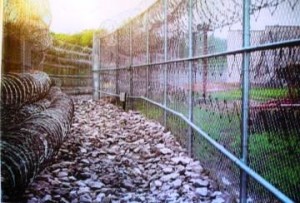



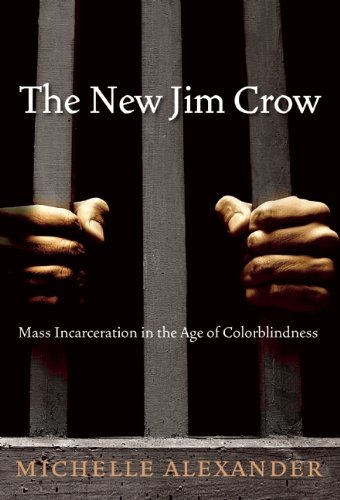
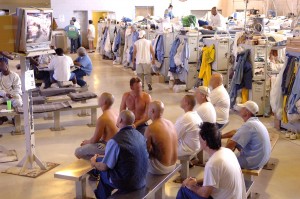
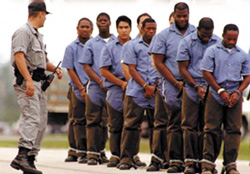

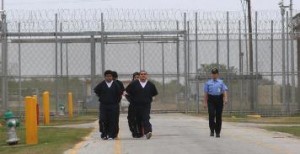







It is 2016, my SON IS AT ROGERS STATE PRISON IN REIDSVILLE ,GEORGIA. HE HAS SPMI, BIPOLAR DISORDER. IT TOOK 2 YEARS TO GO TO COURT. I WAS UNDER SO MUCH DURESS I HAD A HEART ATTACK THE WEEK HE WAS TO BE SENTENCED. HE WAS SENTENCED TO 10 SERVE 3. HE HAD NEVER HAD EVEN A SPEEDING TICKET. HIS DISORDER WAS NOT MANAGED PROPERLY HIS LEVELS WERE OUT OF RANGE WHICH CAUSED HIM TO BE MANIC. HE WAS GRABBED BY THE DEPUTY SNATCHED AROUND AND FEELING AS IF HIS LIFE WAS IN DANGER HE HIT THE DEPUTY. WELL GA, ESPECIALLY GOOD OL BOY SMALL TOWN(FORSYTH,MONROE COUNTY)GEORGIA , THAT MAY AS WELL BE A DEATH SENTENCE.HE WAS PUT IN THE HOLE WITH OUT MENTAL EVAL , MEDICATION OR STABILIZATION FOR 4 DAYS, HE WAS REFUSED BAIL AND THE MAGISTRATE JUDGE CALLED HIM A MONSTER AND A MENACE TO SOCIETY.HE WAS REFUSED A PHONE CALL AFTER HE WAS ASKED BY THE DEPUTY/JAILER ” SO WHAT DID YOU DO? OH WAIT YOU HIT A DEPUTY, YOU CAN’T HAVE A CALL OR ANYTHING ELSE . UNLESS I BROUGHT HIS MEDICATION TO THE JAIL HE WOULDN’T BE GETTING IT BECAUSE IT WAS TOO EXPENSIVE. AFTER 2 MONTHS HE WAS RELEASED BECAUSE “HE COSTS THE COUNTY TOO MUCH MONEY”… AT ROGERS STATE AS WELL AS ALL GA PRISONS, THE INMATES GET VERY SMALL PORTIONS OF FOOD, 3 MEALS A DAY M-F AND ONLY 2 ON SAT AND SUNDAY, MY SON HAS LOST 62 LBS IN 4 MOS. I HAVE WRITTEN THE WARDEN NOTHING HAS BEEN ADDRESSED… I AM MY SON’S GREATEST ADVOCATE BUT I BELIEVE IN HUMAN RIGHTS. EVERYONE SHOULD RECEIVE BASIC NEEDS.
The prison system in America is so corrupt to the core that the only people they can get to work for them now are thugs, abusers and paedophiles that be in prison themselves. Until and unless the American public demands change, these thugs and rapists in uniform will continue to get away with crimes like murder, assault, and the rape of juveniles and women. It’s very easy for the average citizen to get convicted and imprisoned over exceptionally trivial matters, but the prisons themselves are so scared of losing the services of the criminals in uniform that they employ that it’s near impossible to convict them for the far worse crimes they perpetrate against society. Look at this for a perfect example of what I’m talking about: http://www.nydailynews.com/ny_local/2010/10/03/2010-10-03_raped_by_judge_and_justice_system.html